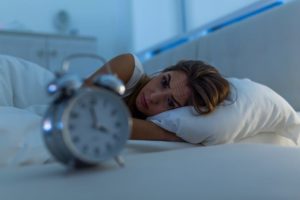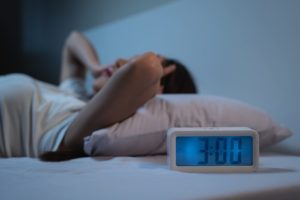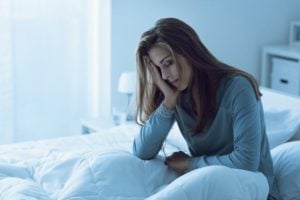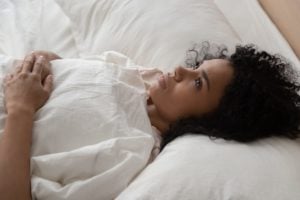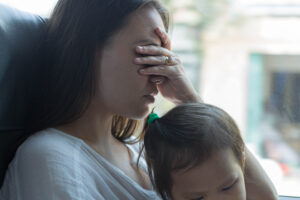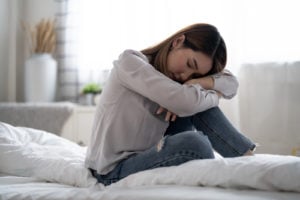Is Insomnia a Mental Illness?
If you or someone you know is in crisis, dial 988 to reach the Suicide and Crisis Lifeline, which provides 24/7, free, and confidential support.
Insomnia is one of the main categories of sleep disorders and can be a stand-alone condition for some people. But for many others, insomnia goes hand-in-hand with the diagnosis of a mental health disorder. In fact, approximately 50% of people living with insomnia also have a mental health condition.
The relationship between mental illness and insomnia is complex. Experts believe that insomnia impacts a person’s mental health, but also that mental health can affect a person’s sleep.
How Are Insomnia and Mental Illness Connected?
Insomnia and mental health problems commonly coexist. The majority of people with mental health problems have insomnia, and roughly a third of people diagnosed with chronic insomnia have a mental health condition.
People with insomnia experience challenges with falling and staying asleep. They also exhibit daytime symptoms that may overlap with the symptoms of a range of mental health conditions. These can include:
- Irritability
- Negative social, educational, and work consequences
- Lack of energy and motivation
- Aggression
- Hyperactivity
- Impulsivity
- Trouble with concentration and attention
- Mood changes
It can be difficult for doctors to determine which disorder began first and whether there is a causal relationship between insomnia and a mental health condition. Rather, experts have concluded that there is a bidirectional relationship between insomnia and mental health, meaning that sleep and mental health greatly influence one another.
How Does Insomnia Affect Mental Health?
For people living with insomnia, not getting enough sleep or getting poor-quality sleep can increase the risk of developing a mental health condition, make the symptoms of an existing condition worse, or impede the effectiveness of treatment.
Evidence shows that sleep deprivation can cause mood changes similar to those seen with anxiety and depression. In other words, people with insomnia may be irritable and have a negative outlook. They may also have a reduced libido or lapses in judgment.
Lethargy is also common, which can lead to drowsiness and an increased need for naps. People with insomnia may find themselves falling asleep at unacceptable times. Relationships with partners and others can become strained, and they may withdraw from their normal range of activities. Work performance can also suffer, to the extent that people are denied promotions or let go from their jobs.
People living with a mental health condition who are diagnosed with a sleep disorder face unique challenges. The symptoms of their mental health condition may be made more severe by disordered sleep, and their treatment may not be as helpful. Overall, those with mental health conditions and insomnia may be less able to handle the tasks of daily living.

How Can Mental Illness Affect Sleep?
Sleep problems are associated with many mental health conditions, including depression, anxiety disorders, bipolar disorder, and others.
Depression
Insomnia is a main feature of depression. Approximately 90% of people with this mental health condition have difficulty falling asleep or staying asleep. As with other mental health conditions, sleep disruptions increase the risk for developing depression, and episodes of depression can make sleep more challenging.
People with depression experience a wide variety of symptoms, including:
- Hopelessness or sadness
- Irritability, annoyance, or anger
- Changes in weight and appetite
- Fatigue
- Feelings of failure, guilt, and worthlessness
- Difficulty making decisions
- Memory problems
- Issues with concentration
People who are diagnosed with depression frequently report having insomnia beforehand. Research also shows that a person’s sleep quality may predict the likelihood of relapsing . In other words, sleep quality may decline before a person is faced with an episode of depression.
Evidence shows that sleep patterns differ in people living with depression. They often take longer to fall asleep, which can lead to sleep deprivation. Data also reveals changes in patterns of rapid eye movement (REM) sleep and reduced slow-wave sleep. Taken together, these differences in sleep patterns may be indicators of depression in those who are undiagnosed.
Anxiety Disorders
A majority of people with anxiety disorders find it difficult to fall asleep or stay asleep. Many people have intermittent worry or anxiety over life stressors that disrupt their sleep on occasion. However, anxiety disorders are different in that they bring about fear and worry that does not resolve. Unresolved worry can affect a person’s long-term ability to get a good night’s rest, as well as disrupt their work, school life, and personal relationships.
- Generalized anxiety disorder (GAD): General anxiety disorder occurs in roughly 5% to 10% of the population. Disturbed sleep is one of the diagnostic criteria for GAD. It can be hard to tease out whether GAD or disturbed sleep began first, since both disorders share similar symptoms, such as changes in daytime functioning and mood.
- Post-traumatic stress disorder (PTSD): Up to 90% of patients with post-traumatic stress disorder experience insomnia. Nightmares are frequent in people with PTSD, which can make people fearful of falling back to sleep.
Bipolar Disorder
Bipolar disorder is a mental health condition marked by changes in mood, concentration, and energy levels. People with bipolar disorder fluctuate between periods of depression, excited behavior, and in some cases mania. People’s sleep patterns can be very different in each of these states.
Evidence suggests that almost all people living with bipolar disorder face sleep difficulties. For those experiencing bipolar depression, the main sleep disruptions are insomnia and hypersomnia, the need for excessive sleep.
By contrast, people in a manic state have a reduced need for sleep. This is different from the inability to sleep during periods of bipolar depression. For example, people may go several days without sleep. They may feel as though they have had adequate sleep and may appear highly energetic despite a lack of sleep.
Some researchers propose that sleep disturbances in people with bipolar disorder are associated with variations in circadian rhythm .
Substance Use Disorders
Insomnia and substance use disorder (SUD) often accompany each other. People with insomnia are more likely to develop a substance use problem. In addition, troubles with insomnia are frequent in people recovering from a substance use disorder and can contribute to substance use relapse.
People with SUD misuse substances such as prescription medications, alcohol, and illicit drugs due to changes in the brain or behavioral problems. Addiction is the most serious form of the disorder. Substance use disorder commonly occurs along with other mental health conditions such as depression, bipolar disorder, anxiety disorders, and schizophrenia.
Experts suggest that ongoing misuse of substances like alcohol and drugs can disturb processes that regulate when people feel awake and when they feel sleepy.
Alcohol has a sedative effect that can help people relax. For this reason, some people find it helpful to have a drink prior to bedtime. Research shows that over 10% of people use alcohol to help them sleep, but people with insomnia are even more likely to use alcohol.
Insomnia typically predates a person’s alcohol abuse by almost a decade and is a significant risk factor for developing alcoholism. Alcohol misuse in people with insomnia is likely to make their symptoms worse. They may also have more significant changes in mood or performance.
Substance use can affect sleep whether someone is an active user, in withdrawal, or in recovery. Insomnia is a chief complaint for those managing sobriety, and sleep disruptions sometimes last for years after a person stops using substances. Research shows that ongoing insomnia during recovery increases the risk that a person will relapse and start using substances again.
Anyone facing a substance abuse disorder should speak with a health care professional for support. A health provider can advise them about recovery programs, as well as effective treatments for insomnia and co-occurring mental health conditions.
Schizophrenia
Schizophrenia is a mental health disorder marked by changes in a person’s behavior, thoughts, and feelings. People with schizophrenia may experience things that are not real or hold strong beliefs about things that are not true. It is not uncommon for people with schizophrenia to lack motivation, lose interest in everyday living, withdraw from family and friends, or fail to find pleasure or joy in life.
People living with schizophrenia experience a range of sleep problems. Research suggests that a substantial portion of people living with schizophrenia report symptoms of insomnia. Other sleep disturbances arise in those living with schizophrenia as well, including disruptions in their circadian rhythm and the way they progress through sleep stages during the night.
Similar to substance use disorder, sleep disruptions may increase the risk of relapse in people receiving treatment for schizophrenia.
How Do You Treat Insomnia?
The two main treatments for insomnia are cognitive behavioral therapy for insomnia (CBT-I) and prescription medications. According to experts, people should receive treatment for their insomnia in addition to any treatment for their mental health conditions. Research shows that treating insomnia in addition to a mental health disorder can improve the effectiveness of treatment for both conditions.
- Cognitive behavioral therapy for insomnia: CBT-I is the preferred initial treatment method for insomnia. Therapy includes elements aimed at identifying and reducing thoughts and behaviors that negatively affect sleep. A trained professional provides education on sleep hygiene, stimulus control, sleep restriction therapy, relaxation exercises, basic sleep education, and other topics.
- Prescription medications: Medications are generally reserved for people who do not respond to CBT-I. To have the greatest effect, medications should be used alongside CBT-I and education about good sleep habits. The U.S. Food and Drug Administration has approved several classes of drugs to treat insomnia. In some cases, doctors may prescribe sedative drugs that are not approved for insomnia to treat the disorder.
“Behavioral therapies are the cornerstone in insomnia treatment. It is important to find trained professionals to deliver CBT-I.”
Dr. Abhinav Singh, Sleep Physician
There are some unique considerations when treating insomnia in people who also receive therapy for mental health conditions. For example, some mental health medications can cause insomnia as a side effect. And certain types of medications should not be prescribed to people with substance use disorder, given the risk of abuse and overdose.
For these reasons, anyone being treated for a mental health condition and insomnia should work closely with their doctor to develop the most effective treatment plan and understand its risks and benefits.
Sleep Hygiene
Healthy sleep habits are particularly important for people dealing with a mental health condition. Often referred to as sleep hygiene, healthy sleep habits help ensure that people get the rest they need to support their physical and mental health.
Some people with mental health disorders may struggle to incorporate self-care practices like sleep hygiene into their daily routines. But there are some simple strategies that people may start with.
- Establish a sleep schedule: People should consider their work, school, and social responsibilities, then set a regular bedtime and wake time that ensures they get the recommended hours of sleep each night. It is important to stick to the same sleep schedule on both weekdays and weekends.
- Keep a sleep diary: Keeping a sleep diary can help people learn more about their sleep patterns and the effects on their mood and quality of life. Some people use trackers that allow them to log their sleep, medication adherence, and symptoms. This information can help them work with their health care providers to manage their mental health.
- Get plenty of light exposure: Light exposure helps regulate the sleep-wake cycle, one of the body’s circadian rhythms. Going outside for at least 30 minutes early in the day can help people feel more awake. In some cases, health care providers may suggest light therapy for people with insomnia and a mental health condition.
- Make time for exercise: Getting 30 minutes of exercise a day benefits both sleep and mental health. Exercise improves mood and helps people fall asleep more easily, though exercise should be avoided too close to bedtime.
When to Talk to a Doctor
Anyone noticing a change in their sleep that lasts more than a few weeks should talk with a doctor. For some, it can be challenging to reach out for help the longer they wait. If possible, make notes about the sleep changes that have occurred and prepare any questions that would be helpful to have answered before speaking to a health care provider.
Talking with a doctor about sleep symptoms is an important part of managing a mental health condition . Changes in sleep can be due to a host of factors, including the diagnosis or a side effect of treatment. Importantly, sleep problems can be signs of a relapse. Talk with a doctor right away if you notice changes that affect your mood or daytime functioning.

Still have questions? Ask our community!
Join our Sleep Care Community — a trusted hub of sleep health professionals, product specialists, and people just like you. Whether you need expert sleep advice for your insomnia or you’re searching for the perfect mattress, we’ve got you covered. Get personalized guidance from the experts who know sleep best.
References
9 Sources
-
Winkelman, J. W. (2023, February 7). Overview of the treatment of insomnia in adults. In R. Benca (Ed.). UpToDate., Retrieved February 16, 2023, from
https://www.uptodate.com/contents/overview-of-the-treatment-of-insomnia-in-adults -
Bonnet, M. H., & Arrand, D. L. (2022, October 4). Evaluation and diagnosis of insomnia in adults. In R. Benca (Ed.). UpToDate., Retrieved February 16, 2023, from
https://www.uptodate.com/contents/evaluation-and-diagnosis-of-insomnia-in-adults -
Seow, L. S. E., Verma, S. K., Mok, Y. M., Kumar, S., Chang, S., Satghare, P., Hombali, A., Vaingankar, J., Chong, S. A., & Subramaniam, M. (2018). Evaluating DSM-5 insomnia disorder and the treatment of sleep problems in a psychiatric population. Journal of Clinical Sleep Medicine, 14(2), 237–244.
https://pubmed.ncbi.nlm.nih.gov/29394962/ -
Nutt, D., Wilson, S., & Paterson, L. (2008). Sleep disorders as core symptoms of depression. Dialogues in clinical neuroscience, 10(3), 329–336.
https://pubmed.ncbi.nlm.nih.gov/18979946/ -
Gold, A. K., & Sylvia, L. G. (2016). The role of sleep in bipolar disorder. Nature and science of sleep, 8, 207–214.
https://pubmed.ncbi.nlm.nih.gov/27418862/ -
Bonnet, M., & Arand, D. (2022, April 15). Risk factors, comorbidities, and consequences of insomnia in adults. In R. Benca (Ed.). UpToDate., Retrieved February 28, 2023, from
https://www.uptodate.com/contents/risk-factors-comorbidities-and-consequences-of-insomnia-in-adults -
American Psychiatric Association. (2020, August). What are sleep disorders?, Retrieved March 1, 2023, from
https://www.psychiatry.org/patients-families/sleep-disorders/what-are-sleep-disorders -
Neubauer, D. N. (2022, December 19). Pharmacotherapy for insomnia in adults. In R. Benca & J. G. Elmore (Eds.). UpToDate., Retrieved March 1, 2023, from
https://www.uptodate.com/contents/pharmacotherapy-for-insomnia-in-adults -
National Institute of Mental Health. (2022, November). Help for mental illnesses., Retrieved March 1, 2023, from
https://www.nimh.nih.gov/health/find-help



